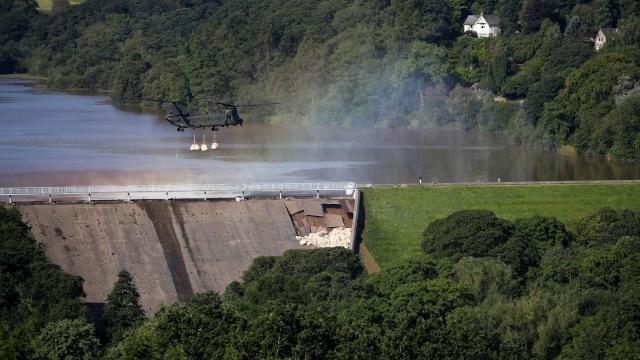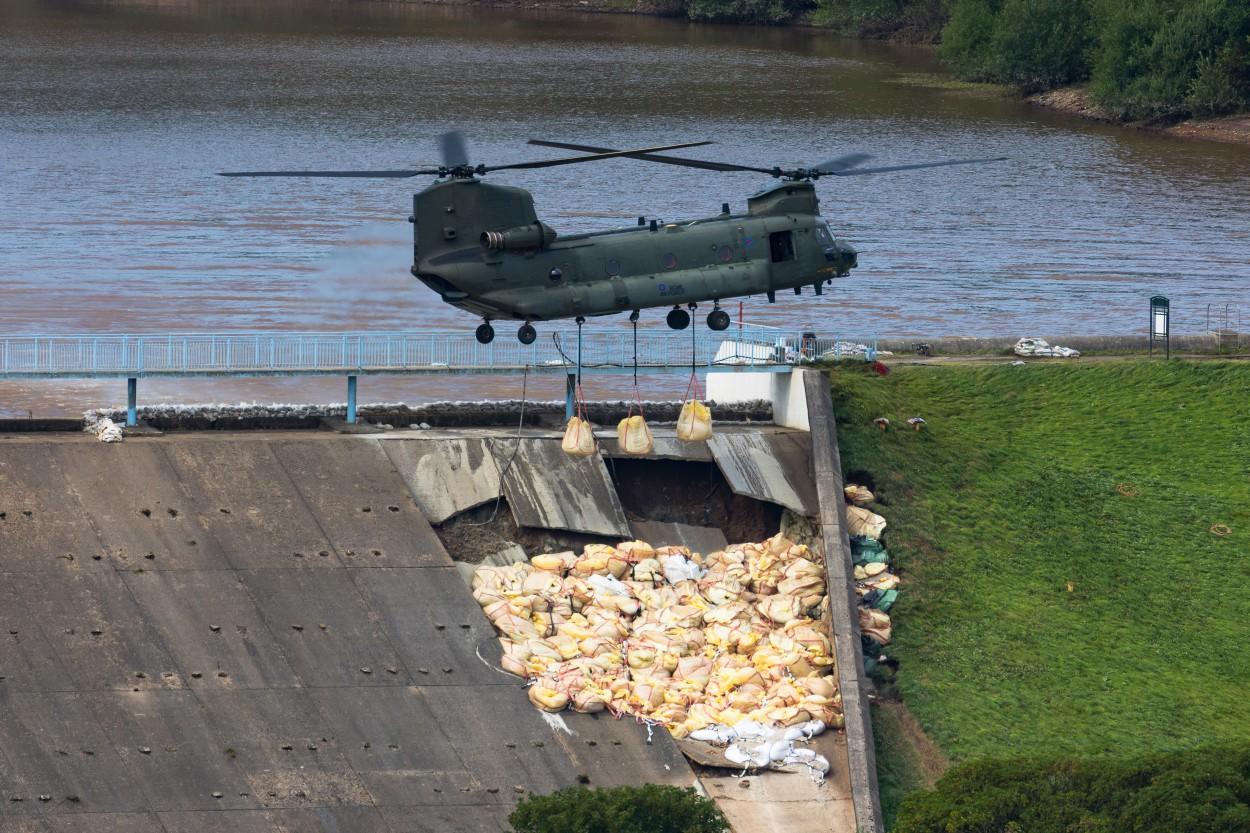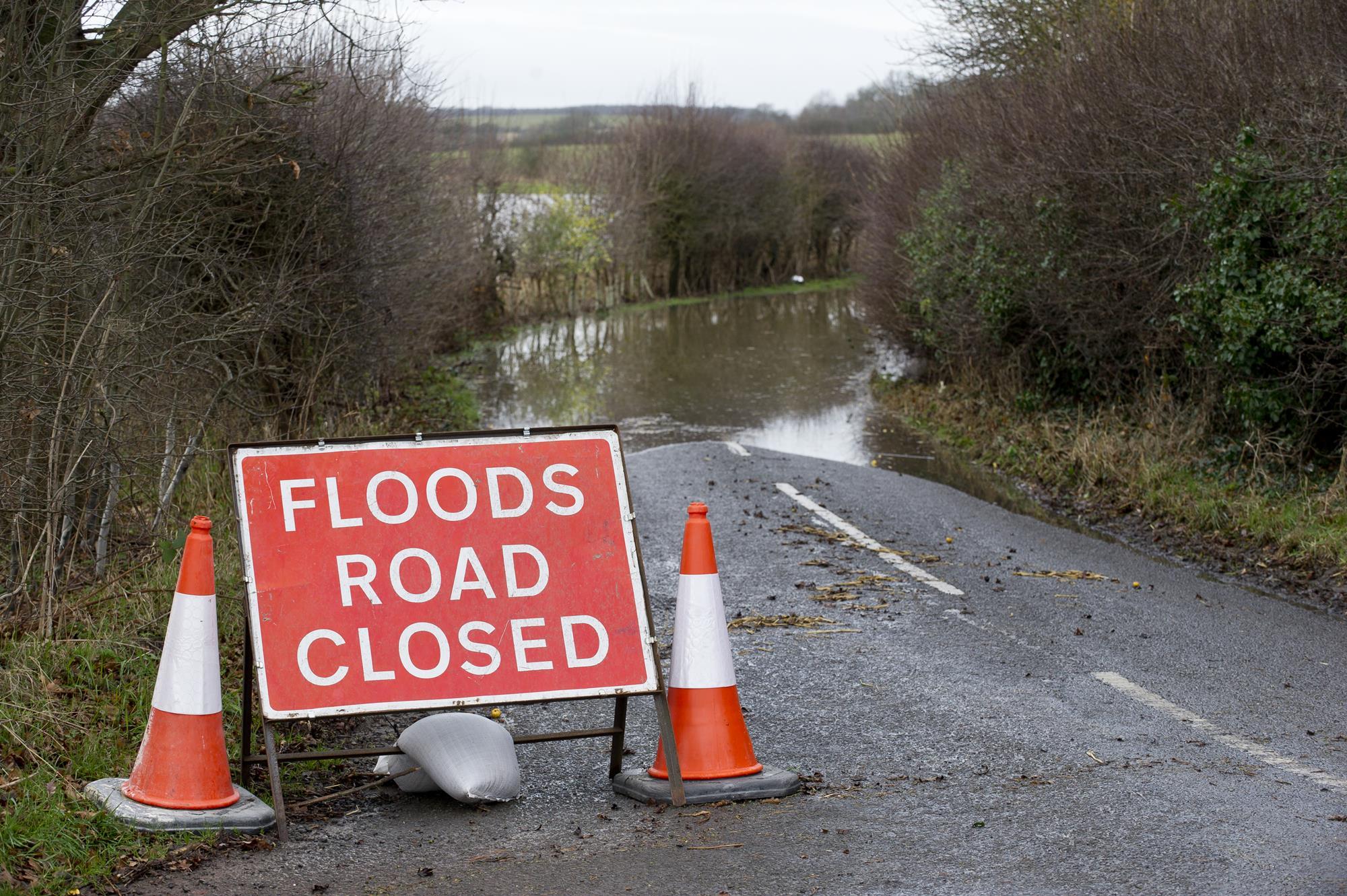
Panic, anxiety, bedlam and overnight renown seized the ordinarily quiet town of Whaley Bridge in the Peak District, north west England, when the town’s dam partially collapsed in August. The event put the climate crisis front and center in Britain, where lawmakers earlier this summer declared a climate emergency.
In the dam collapse, torrential summer rain caused huge volumes of water to cascade through the hills of the Peak District, increasing the water levels of the reservoir situated above the town. The rising water then overflowed into the emergency spillway. Unable to accommodate the flood, produced by half a month’s worth of rain that fell in one day, the protective concrete facing of the dam was damaged leaving a substantial hole.
Circling RAF helicopters dumping hundreds of tonnes of aggregate on the ruined dam were broadcast on TV as panic intensified over whether continuing rainfall would erode the dam further – resulting in potentially 300 million gallons of water flooding onto the town, destroying lives and homes.
With the dam considered a "high risk" of collapse, Whaley Bridge residents were evacuated. Emergency services, Armed Forces, engineers and volunteers worked round the clock to reduce the water in the reservoir to a safe level, and almost a week after the dam's breakage, residents were allowed to return to their homes.
Now, as the small Derbyshire community tries to regain normalcy the emergency and what posed a real threat to human life is being linked to climate change and the volatile, extreme weather the UK is increasingly experiencing. For many, the event served as a wake-up call for England to reduce carbon emissions and make climate change disaster preparedness a greater priority.
For decades, scientists have voiced concerns about climate change and the catastrophic effects from higher carbon dioxide in the atmosphere. As James Dyke, a sustainability science and environmental commentator, wrote in the Independent: “The scene unfolding in Whaley Bridge shows us how involved, expensive and dangerous this process is going to be. For those evacuated, it literally brings climate change home."
Dyke added that increasingly volatile weather patterns mean similar incidents will occur across Britain in the coming years.
“We must understand that until global emissions of carbon dioxide are effectively zero, then what we currently consider to be dangerous, once-in-a-lifetime events, will be dwarfed by the extreme episodes that will impact our children and future generations.”
The Met Office, the UK’s national weather service, issued a similar warning that so called "once-in-a-lifetime" incidents caused by extreme weather are likely to become more frequent as the climate changes.
Identifying some alarming patterns in British weather over the last 135 years, the Met Office noted how the top 10 hottest years recorded in Britain have taken place since 2002 – and the ten wettest years have occurred since 1998. These figures are “further indications of a changing climate,” the Met Office warned.
Luke Pollard, Labour MP and shadow minister for flooding, responded to the Whaley Bridge dam emergency in a similar tone. In a statement about the emergency, Pollard wrote: “This must act as a wake-up call to the government on the urgency of preparing for the inevitable impacts of climate change. Over the past decade, severe weather events have cost on average £1.5 billion per year.”
Pollard added that "more extreme rainfall in summer is a widely known projection of climate change. When the atmosphere is warmer that means it can hold more moisture, and so summer thunderstorms could get more extreme."
In response to the partial dam collapse emergency in Whaley Bridge, Greenpeace UK tweeted: “This is a new reality in the UK as #climatechange lead to more extreme rainfall. When will the government start taking this #ClimateEmergency seriously?”
For the local people in the Whaley Bridge vicinity, the suggestion that climate change contributed to the partial collapse of the dam has fomented debate. A number of residents have resisted the notion, believing the damage to the dam – which was built in 1840-41 – was due to lack of maintenance.
But there is a sizeable lobby of people in the area who deem climate change the primary culprit. One such thinker is Stuart Price, a resident of New Mills, a neighbouring town of Whaley Bridge.
Price, who founded Changing Times, an online magazine that discusses climate change themes, informed Occupy.com of his thoughts about the recent events in Whaley Bridge.
“The situation at Whaley has come about because of an extreme weather event. These are becoming more and more common, both here and throughout the world, creating havoc and distress for ever increasing numbers of people," he said.
“The infrastructure that we currently have is struggling to cope with this and, like the dam at Whaley, is crumbling. These extreme weather events are having an ever-increasing impact on our ability to lead the kind of lives that we have become used to.
"We are faced with two alternatives: either spend an extortionate amount of money to create a whole new infrastructure to deal with a situation that is just getting worse, or else change the way we live,” Price said.
Roderick Smith, a professor at Imperial College London, acknowledged the link between volatile weather and older dams, telling The Telegraph: “Extreme weather events mean that there is increasing unease about the safety of older dams; particularly the need to release excess water safely and easily.”
Several residents of the Whaley Bridge vicinity rightly point to the fact that there is nothing new about heavy rainfall in the Peak district and say there have been recordings of flooding and landslides in the area for many years.
As the Met Office notes, due to its geographical location in the north west of England, the mountains of the northern and western UK force the prevailing westerly winds to rise, which cools the air and increases the formation of cloud and rain. Hence why the Peak District is so beautifully green.
Because of its location, the area will always be naturally prone to rainfall. But changeable weather is becoming more common in the UK. Just days before the heavy rainfall in the run-up to the partial dam collapse at Whaley Bridge, the region basked under glorious sunshine, with July reaching the highest temperatures ever recorded.
But despite parts of the UK being naturally prone to more extreme weather, the Met Office, citing historical trends in extreme weather events, warned that if emissions continue to increase the country may see an “increase in the frequency of hot days and heavy rainfall events.”
For Price, ignoring experts’ warnings about climate change would be more than foolish. “Because this [Whaley Bridge dam damage] was a life-threatening event, would it not be wise to pay attention to expert opinion?” he asked.
Catherine Hughes, Secretary of the New Mills and Hayfield Labour Party branch, told Occupy.com she believed the dam failure was due to a combination of factors.
“There is no definitive answer to whether climate change is responsible for the Whaley dam failure. Our research points to a combination of increasingly excessive, heavy rainfall linked to climate change, and a total failure of the Canal & Rivers Trust to maintain the dam,” said Hughes.
Rather than making climate change a priority and decarbonising the country while investing in new clean energy jobs, Prime Minister Boris Johnson has voiced repeated denial about climate change. In 2015, writing in The Telegraph, Johnson argued that the unusually warm winter weather had nothing to do with a changing climate.
“It is fantastic news that the world has agreed to cut pollution and help people save money, but I am sure that those global leaders were driven by a primitive fear that the present ambient warm weather is somehow caused by humanity; and that fear – as far as I understand the science – is equally without foundation. There may be all kinds of reasons why I was sweating at ping-pong [in December] – but they don’t include global warming,” Johnson wrote.
Worryingly, many Boris Johnson advocates seem to hold a similar blasé stance on climate change. A recent analysis based on Conservative Party membership data revealed that one in five Tory members would like to see less emphasis on climate change, with the figure rising to one in four among Johnson supporters.
Unlike Johnson and his cabinet, regarded as “bad news for the environment,” a Labour government promises to “prioritise a sustainable, long-term future for our farming, fishing and food industries, fund robust flood resilience, invest in rural and coastal communities, and guarantee the protection and advancement of environmental quality standards."
By investing in robust flood resilience and planning, the next time torrential rain pours down like it did at Whaley Bridge, rural, flood-prone areas will be better prepared.















